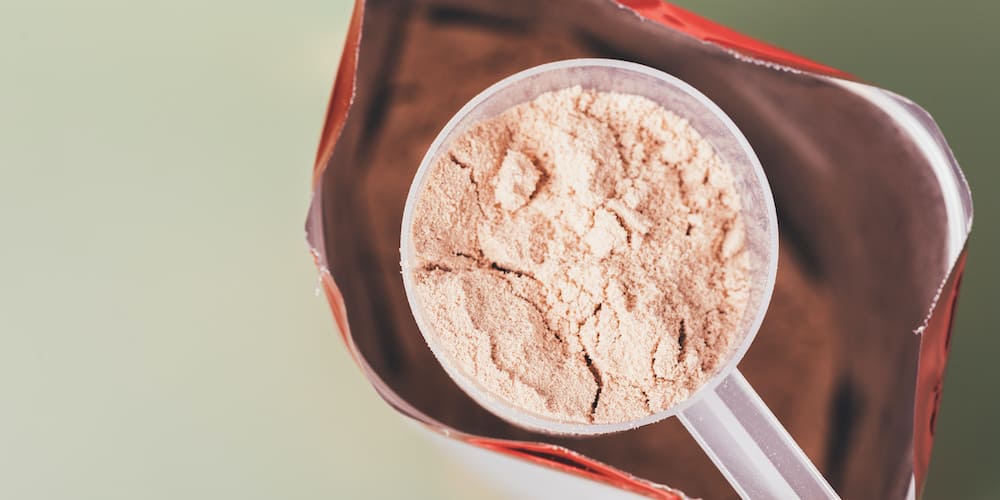Often, weight gain is the result of an energy imbalance: when calorie intake exceeds expenditure, the body stores energy.
This implies an increase in fat mass. However, it is also possible to develop muscle mass, which is physiologically very different.
Weight gain and muscle hypertrophy are therefore two situations that should be clearly distinguished.
Another essential point: not all calories are equal. The body does not use fats, carbohydrates, or proteins in the same way. To determine whether whey makes you gain weight, it’s ultimately the overall eating habits that need to be observed. I’ll explain.
📚 Also read | Which are the 4 best whey isolates?
Links between whey supplementation and body weight gain
Whey is low in sugars and fats
I recommend choosing a whey isolate lower in sugar or a hydrolysate instead. More concentrated in protein, they are generally easier to digest than other protein powders.
Indeed, low in lactose, these whey products prevent the feeling of bloating. They are also absorbed more quickly: within 20 to 30 minutes.
Another advantage, whey is also low in fat. The whey (the liquid milk byproduct) from which it comes is naturally low in lipids.
On average, expect between 100 and 120 calories per whey shake, with less than 2 g of carbohydrates per serving. That’s not a very high energy contribution in itself.
Unlike some high-protein, calorie-dense foods like fatty fish, nuts and legumes, whey allows you to increase protein while limiting calories.
I take whey and I’ve gained weight
If you are gaining weight with whey, question your eating habits and sensations. Are you eating more? Is your appetite greatly increased? Are you training less?
No single food or nutrient will make you gain weight on its own. Ultimately, what matters is your overall diet. If your diet is high in calories, adding whey will not make you gain more weight, nor will it make you lose weight.
What can happen with appropriate training: gain muscle without losing fat and therefore register a higher weight on the scale.
In reality, you are not getting fatter. It’s muscle anabolism, whether you consume whey or not.
Another possible outcome: lose fat while gaining muscle thanks to whey and appropriate training. Not much happens on the scale in terms of weight, yet the physical and health results are real!
Does whey make your belly bigger?
Another question I often hear from the athletes I follow: Does whey make you gain belly fat?
It turns out that whey consumption in athletes could actually help reduce abdominal fat according to this study.
The right amount of whey per day
To meet your needs, start by assessing the amount of protein you need.
For example: you weigh 80 kilograms. Calculate: 80 x 1.6 g = 128 g of protein per day. Since 1 whey shake provides about 25 g of protein on average, two per day will already supply 50 g of protein.
By also including 2 eggs with nuts in the morning, a portion of meat or fish at lunch and dinner and plain skyr for dessert, your recommended daily protein amount is reached.

Links between protein and body weight
Calories from protein
Among the three essential macronutrients, fats are the most energy-dense: 1 g releases 9 calories. While 1 g of protein releases 4 kcal, as do carbohydrates.
The roles of proteins are many: they help build muscle, skin, hair, and nails, and maintain nitrogen balance. They are the basis of all cellular life: enzymes, hormones, antibodies.
Eating protein every day is therefore essential! Animal and plant proteins release amino acids, including some essential ones the body cannot produce on its own.
To digest, absorb and then transport them, they force the body to expend a lot of energy. They are the macronutrient with the highest thermic effect.
The right amount of protein per day
Recommendations for adults are around 0.8 g of protein per kilogram of body weight per day, or about 15% of total daily energy.
When you engage in regular physical activity or during weight loss, protein needs can rise to 1.6 g per kg of body weight per day.
This corresponds to about 20-30% protein per day, an amount higher than the recommendations of the ANSES.
Too much protein
Unlike carbohydrates and fats, an excess of protein does not accumulate as fat.
Eating too much protein can cause acidification of the body leading to bone disorders, water retention and kidney problems.
So it’s important to be consistent with your daily intake. Abusing whey shakes won’t be any more effective for losing weight nor for building more muscle.
Not enough protein
Conversely, a lack of protein causes the body to draw on its muscle reserves to make its own proteins. Fatigue, hair loss, weakened immunity…
Researchers have highlighted that not eating enough protein can lead to eating more calories and promoting weight gain.
Keep in mind that you can just as well take protein shakes without being an athlete to get extra protein and meet your needs.
For example, you can incorporate whey as a slimming snack in the morning, rather than a sugar-rich pastry that often makes you hungry a few hours later.
If you like snacking in the afternoon, try a whey-based recipe like a high-protein pancake.
Don’t hesitate to consult a dietitian who can help you find the right balance. Whey itself shouldn’t make you gain weight as such and, above all, weight alone is not a sufficient indicator.
📚 Also read | A dietitian tested 12 whey protein brands — here are the results
Sources and scientific studies
V A Aparicio, E Nebot, R García-del Moral, M Machado-Vílchez, J M Porres, C Sánchez, P Aranda – High-protein diets and renal status in rats, 2013
Juha J Hulmi, Mia Laakso, Antti A Mero, Keijo Häkkinen, Juha P Ahtiainen, Heikki Peltonen – The effects of whey protein with or without carbohydrates on resistance training adaptations, 2015
Anna R Ogilvie, Yvette Schlussel, Deeptha Sukumar, Lingqiong Meng, Sue A Shapses – Higher protein intake during caloric restriction improves diet quality and attenuates loss of lean body mass, 2022



